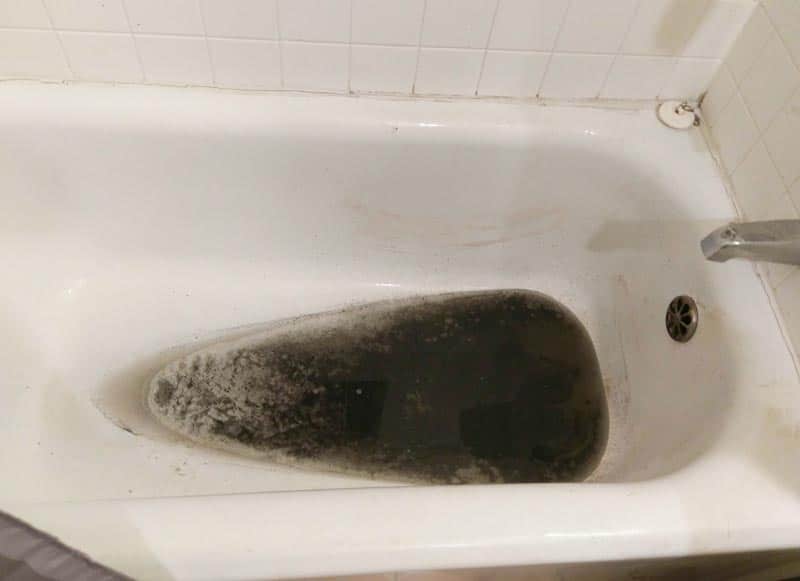An Guide to Sewage Emergence in the Bathtub
An Guide to Sewage Emergence in the Bathtub
Blog Article
Presented here underneath you will find additional decent insights involving What To Do If Sewage Starts Backing Up Into the Shower.

Sewage backup in the bath tub can be a traumatic and unhygienic trouble for any type of property owner. Not only is it bothersome, however it also poses significant health and wellness threats and suggests underlying problems with the plumbing system. Understanding why sewage is coming up via the tub is vital for taking ideal action to resolve the problem successfully.
Introduction to the Problem
Recognizing the Problem
When sewage draws back up into the tub, it's a clear sign of a trouble with the water drainage system. The wastewater that should be moving away from your home is instead discovering its way back right into your space, which can result in significant damage and carcinogen.
Potential Causes
A number of aspects can add to sewer back-up in the tub. From obstructions in the drain line to problems with the plumbing infrastructure, identifying the root cause is vital for locating a remedy.
Usual Factors for Sewage Back-up
Clogs in the Drain Line
One of the most common reasons for sewer backup is a blockage in the sewage system line. This can happen due to the buildup of debris, oil, or international objects in the pipelines, avoiding correct flow and creating sewer to support into your tub.
Tree Root Invasion
Tree origins seeking dampness and nutrients can penetrate sewage system lines via tiny cracks or joints. In time, these origins can expand and increase, triggering considerable damage to the pipelines and causing sewage back-up concerns.
Aging Infrastructure
Older homes may have dated plumbing systems that are extra susceptible to deterioration, fractures, and deterioration. As pipes age, they become much more prone to leaks and blockages, increasing the probability of sewer backup occurrences.
Heavy Rainfall or Flooding
During periods of heavy rainfall or flooding, the drain system might end up being overwhelmed with excess water, causing back-ups and overflows. This can lead to sewage supporting into tubs and other components inside the home.
Health And Wellness Risks Related To Sewage Back-up
Contamination of Water Supply
Sewer back-up can pollute the water supply in your house, posing a severe health and wellness threat to you and your household. Direct exposure to contaminated water can cause gastrointestinal problems, skin infections, and various other health problems.
Spread of Condition
Sewer consists of dangerous germs, infections, and parasites that can trigger a variety of conditions, consisting of liver disease, cholera, and gastroenteritis. Coming into contact with sewage or polluted surface areas puts you in danger of infection.
Mold Growth
Wetness from sewage back-up can produce excellent problems for mold and mildew growth in your home. Mold and mildew spores can aggravate respiratory system issues and cause allergic reactions in delicate people, making punctual clean-up important.
Signs of Sewer Backup
Foul Odors
Unpleasant odors originating from drains or components, especially in the bathroom, might indicate sewer backup concerns. These odors are often solid and persistent, indicating a trouble that requires immediate interest.
Slow Draining Fixtures
Tubs, sinks, and commodes that drain slowly or otherwise at all could be experiencing sewer backup. If numerous fixtures are affected all at once, it's most likely that the issue originates from an usual factor, such as the main sewer line.
Gurgling Noises
Unusual gurgling or gurgling sounds originating from drains when water is running in other places in your house are a measure of air entraped in the plumbing system. This air build-up can arise from sewer back-up and should be examined quickly.
Immediate Actions to Take
Turning Off Supply Of Water
In the event of sewer back-up, it's vital to shut off the supply of water to prevent more contamination and damages. Locate the main water shutoff valve in your house and closed it off until the concern can be solved.
Getting In Touch With a Professional Plumber
Dealing with sewer back-up is not a DIY work. Get in touch with a certified plumber with experience in handling sewage-related problems to analyze the situation and carry out required repairs or cleanings.
Staying Clear Of Contact with Polluted Water
Until the sewage backup is resolved, avoid contact with contaminated water to prevent the spread of microorganisms and pathogens. Use safety gear if you must be in the affected area and wash your hands thoroughly afterward.
Preventive Measures
Regular Maintenance of Sewer Lines
Schedule normal inspections and maintenance of your sewage system lines to recognize and attend to possible concerns before they escalate right into significant problems. This can include cleaning out particles, checking for tree root intrusion, and fixing any broken pipelines.
Setting Up Bayou Valves
Consider mounting backwater shutoffs in your plumbing system to stop sewage from receding into your home during durations of heavy rainfall or flooding. These shutoffs instantly close when water starts backing up, safeguarding your residential or commercial property from contamination.
Correct Disposal of Family Waste
Avoid flushing anything aside from bathroom tissue and human waste down the commode to stop clogs and obstructions in the sewer line. Dispose of oil, oil, and other family chemicals correctly to lessen the risk of plumbing issues.
Tidying up After Sewer Back-up
Sanitation Procedures
Extensively decontaminate and disinfect influenced locations after sewer backup to eliminate damaging germs and stop mold growth. Use ideal cleansing products and protective gear to make certain risk-free and efficient cleanup.
Reconstruction of Impacted Areas
Repair any kind of damage to floor covering, walls, or components triggered by sewage back-up. Depending on the level of the damage, you might need to replace carpeting, drywall, or other products to recover your home to its pre-loss problem.
Why is There Sewage Coming Up Through the Bathtub
Sewage in your bathtub is a major problem that can make you want to abandon the bathroom for good. You don’t have to. However, it is important to identify the source of the issue and take the necessary steps to resolve it in order to avoid any health risks and property damage. In this article, we will discuss what could be causing sewage to back up through your bathtub so you can take action quickly and effectively.
The Main Reason For Sewage Backup in The Bathtub
All the sinks and toilets in your home connect to different pipes that lead to the main sewer line. The sewer line then connects to the municipal sewer system. This connection works seamlessly on a daily basis, but there can sometimes be a problem with the main sewer line.
The most common cause of sewage backup is a clogged or blocked main sewer line. The main sewer line can be clogged due to the accumulation of debris, tree roots or grease buildup, or other materials. Another possible cause is a collapsed pipe. When this happens, your toilets and sinks won’t be able to drain properly. This is when sewage starts backing up through the bathtub. If the problem has been occurring for some time now, it might be time to consult with a plumber as there may be more severe damage that needs fixing.
How Can You Tell if it’s Coming From Your Sewer Line?
If you’re experiencing a sewage backup in your bathtub, then you can use a few simple methods to determine if it is coming from the main sewer line. First, try to unclog the tub drain with a plunger or an auger and see if that helps. If not, then inspect all of the drains in your house and check if there is any blockage in them. If some of the other drains are not working fine, then it’s likely the problem is with your main sewer line.
Common Signs of a Clogged Main Sewer Line
If you suspect that your main sewer line is blocked, then there are a few common signs to look out for. Frequent clogs in your home are a sure sign of a clogged sewer line. You can also check for slow drainage from all the plumbing fixtures.
Slow Drains
If you notice that it takes longer for your sinks and toilets to drain, then this could be a sign of a clogged main sewer line.
Frequent Clogs
Another common sign is that your drains or toilets become clogged almost all of the time. If this happens, then it could be a sign that the main sewer line is blocked.
Water Backup
Do you notice water or sewage coming back up from any of the drains in your home? If your answer is yes, you may have a clogged main sewer line.
Sinkholes
If you’ve noticed sinkholes in your yard or overflowing sewage from the ground, you may be facing a blocked sewer line issue.
Your Shower or Sink Makes Gurgling Noises
Have you noticed gurgling noises coming from your sink or shower lately? These are typically signs of a blocked sewer line and should be checked out immediately.
How to Prevent a Main Sewer Line Clog
Once you’ve identified that your main sewer line is clogged, it’s important to take steps to prevent it from happening again. The best way to do this is to avoid putting any solid material that can clog the drain, such as grease and other debris. You should also be mindful of what you flush down your toilet. In addition, you should schedule regular maintenance for your main sewer line. This will help keep it clear and free from clogs or backups.
What Should You do if You Notice Sewage Backing up Through The Bathtub?
If you’ve noticed sewage backing up through the bathtub, then it is important to call a professional plumber immediately. A plumber can inspect the situation and determine what the cause is, such as a blocked main sewer line. They will also be able to advise you on how best to fix the issue. In some cases, a simple drain cleaning may be all that is needed.
However, if the blockage is severe, then your plumber may need to use more advanced methods to clear the blockage.
No matter what, it is important to always call a professional plumber if you experience any kind of sewage backup. They will be able to assess the situation and provide you with a solution that is best for your home.
https://baylorinc.com/blog/why-is-there-sewage-coming-up-through-the-bathtub/

We hope you liked our part on What to Do if Sewage Starts Coming Up Through Your Bathtub. Thanks for spending some time to read our blog post. Please pause to promote this blog entry if you enjoyed it. I enjoy reading our article about Why is Sewage Backing Up Into My Bathtub?.
Click Here
Report this page